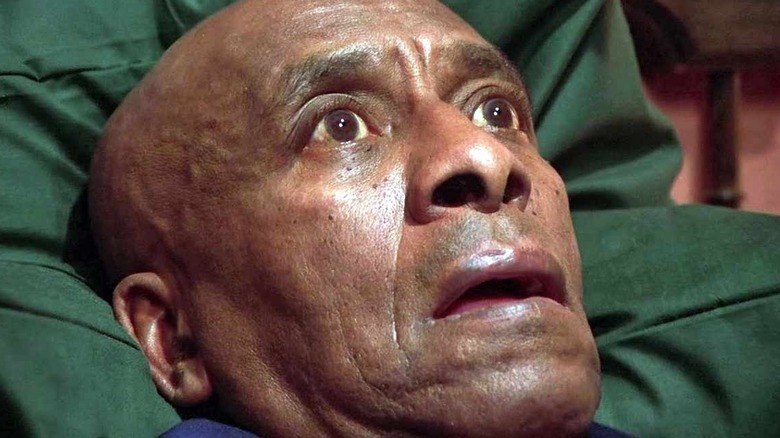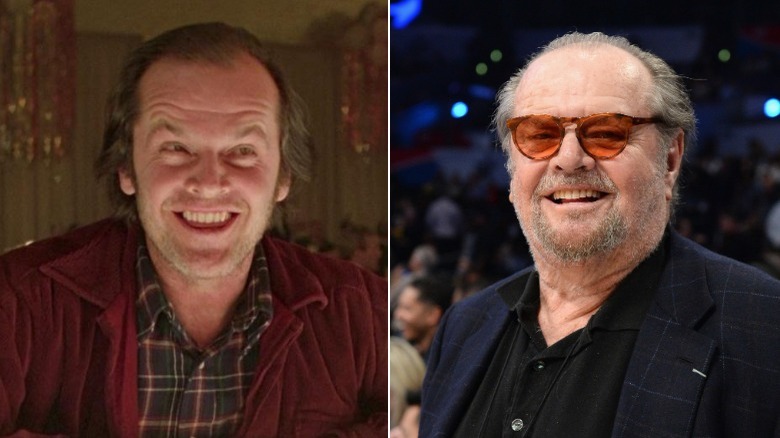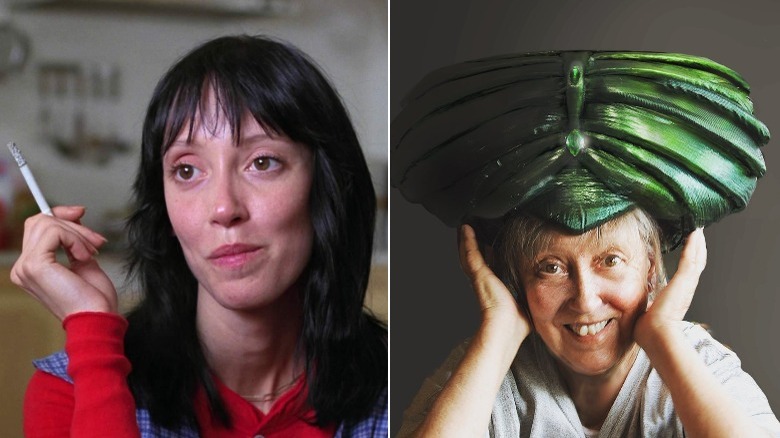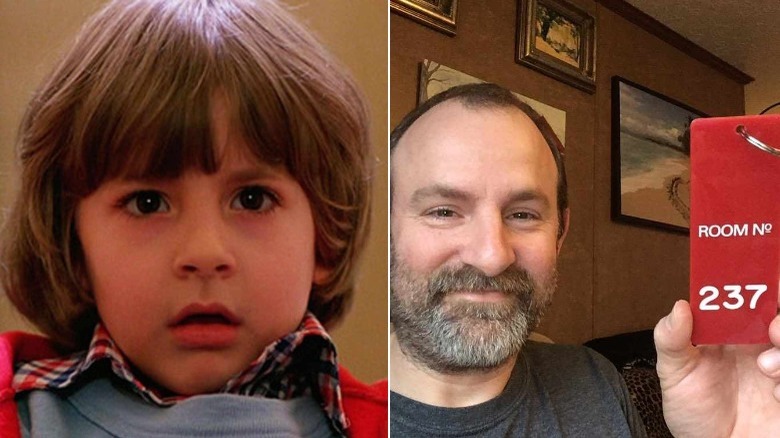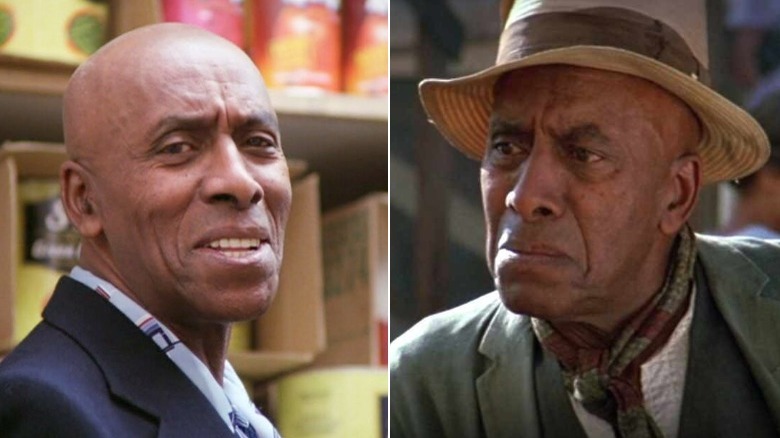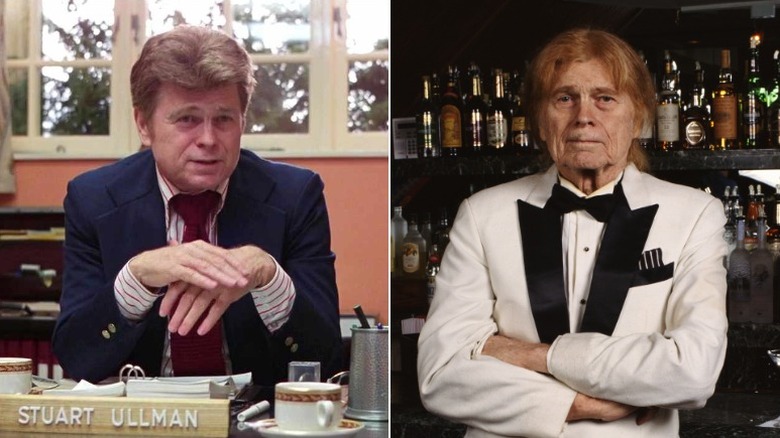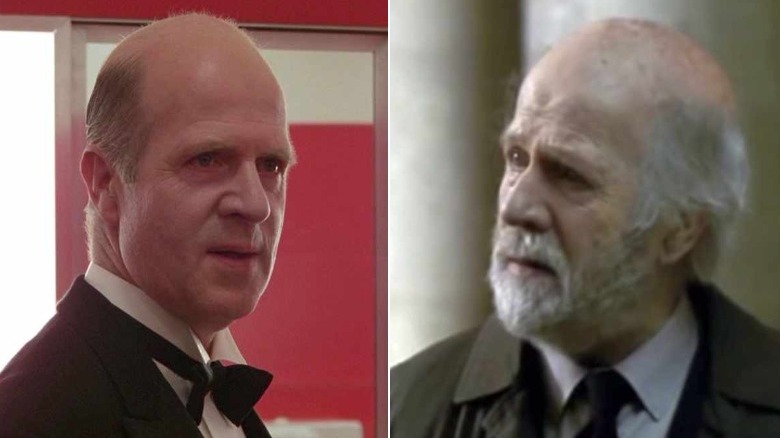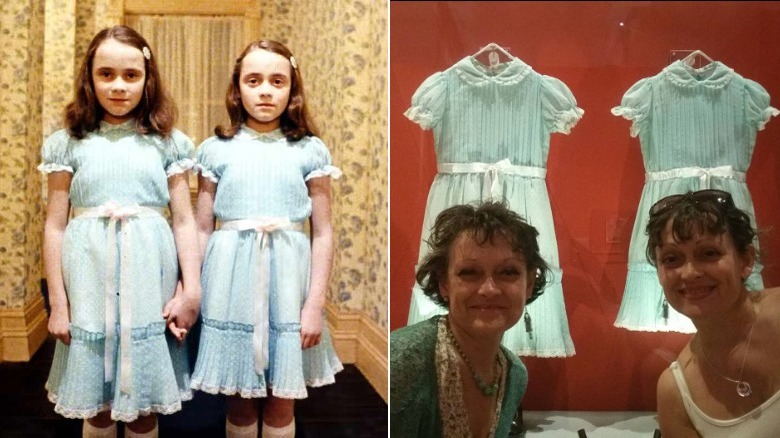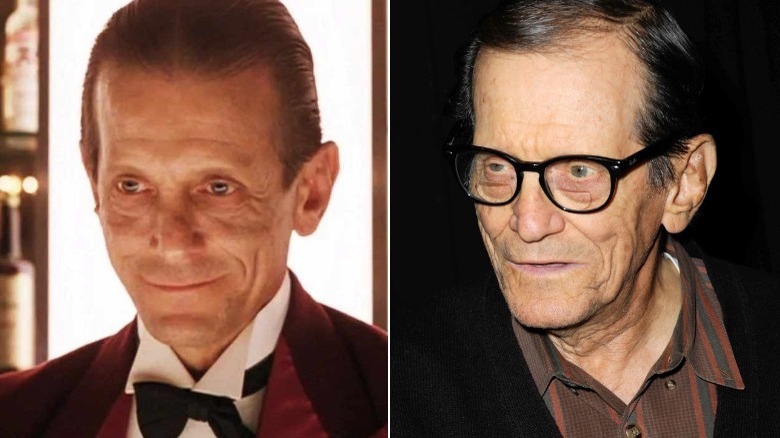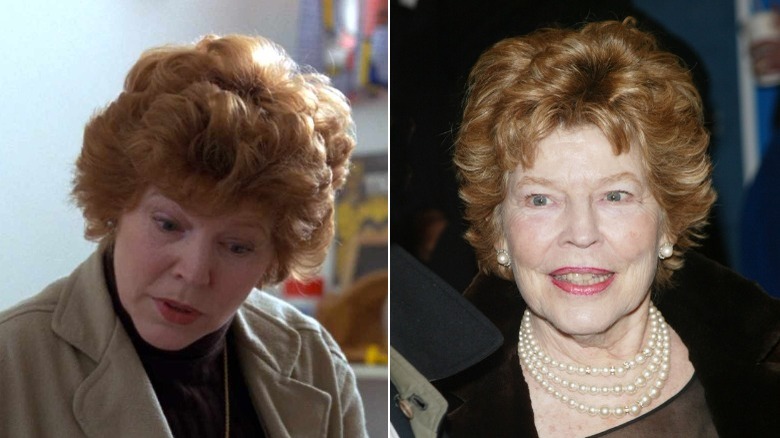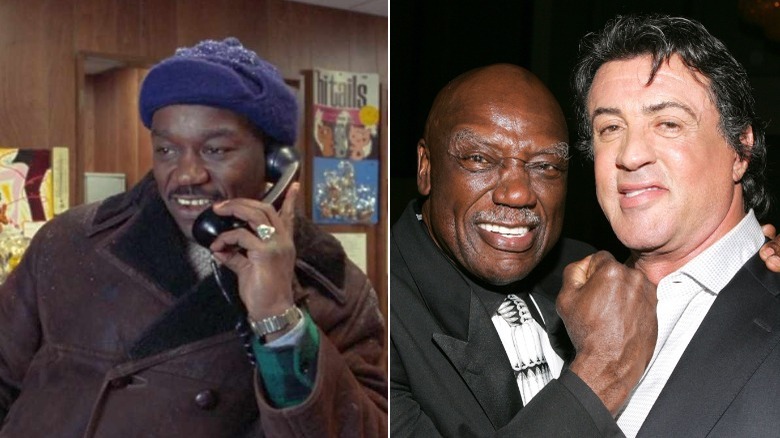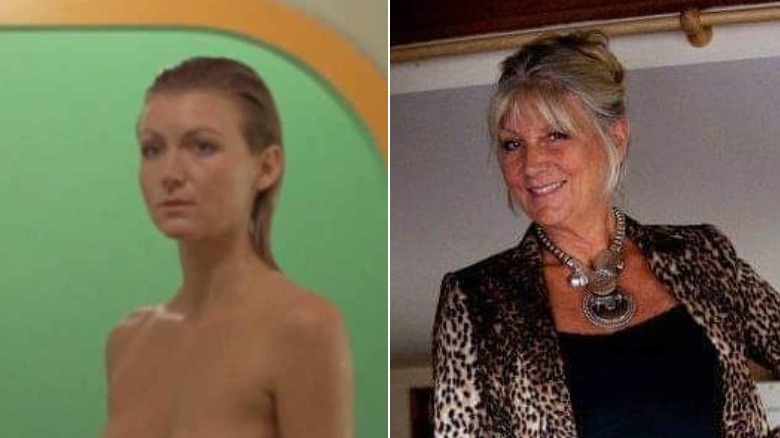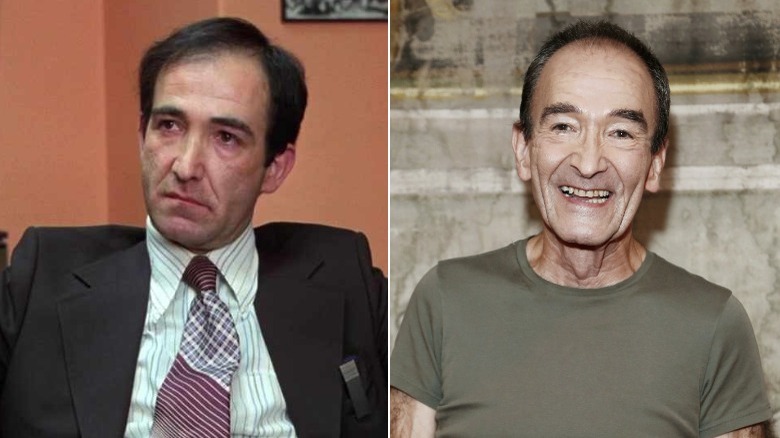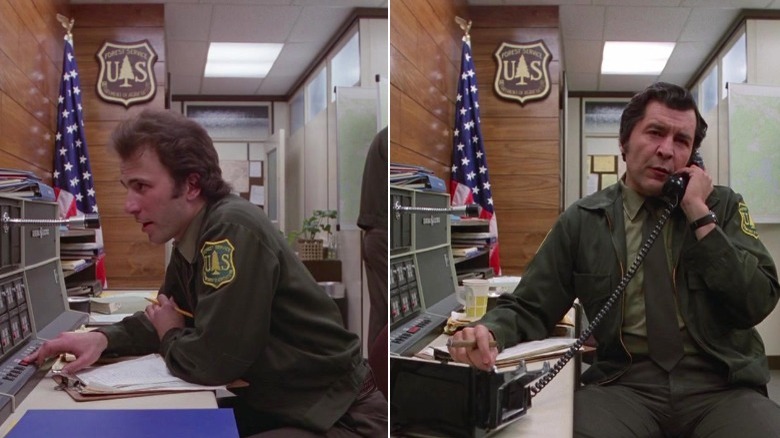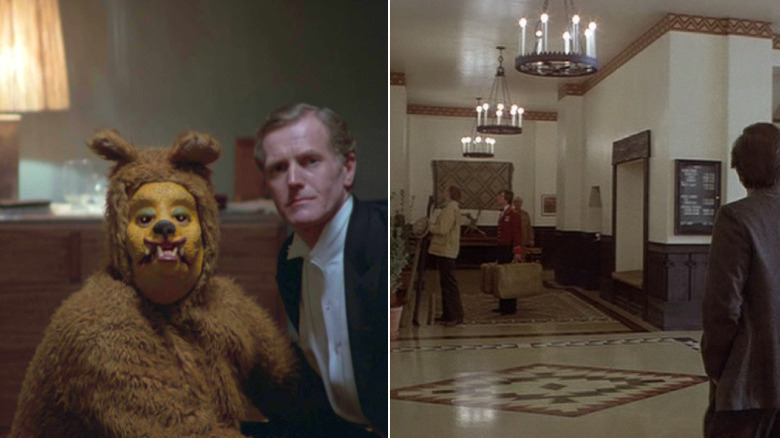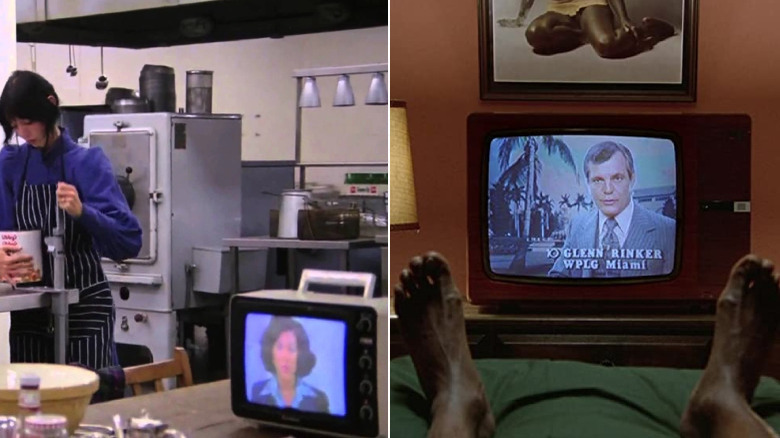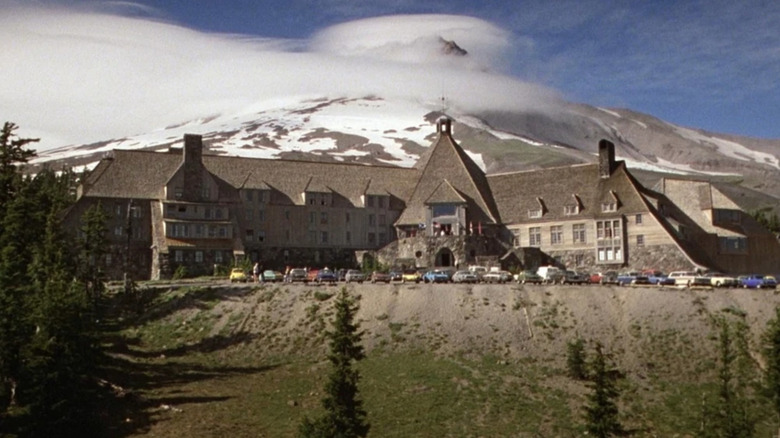Whatever Happened To The Cast Of The Shining?
While Stephen King may be one of the few detractors of Stanley Kubrick's take on his 1977 novel "The Shining," about a spirited hotel wreaking havoc on an isolated family, most who have entered the director's maze-like 1980 film still remain hypnotized and entranced by its visual and mental terror to this day. That includes the cast and crew who helped to form this masterpiece of horror, which opened the same weekend as "The Empire Strikes Back." That's telling, as many of these actors were working with Kubrick for the very first time and had never experienced a director so meticulous, unrelenting, and demanding of their time and talents.
Kubrick was notorious for filming a lot of takes, and his actors never seemed to know why or what they were doing wrong. In talking to author Michel Cement about "The Shining," he reasoned, "An actor can only do one thing at a time, and when he has learned his lines only well enough to say them while he's thinking about them, he will always have trouble as soon as he has to work on the emotions of the scene or find camera marks. In a strong emotional scene, it is always best to be able to shoot in complete takes to allow the actor a continuity of emotion, and it is rare for most actors to reach their peak more than once or twice." For better or worse, no actor was ever the same after exiting the clutches of Kubrick and his Overlook Hotel, but most left with good memories. Let's see whatever happened to the cast of "The Shining," or as hotel manager Stuart Ullman would say, "all the best people."
Jack Nicholson (Jack Torrance)
By the time Jack Nicholson came under the "courageous" yet "relentless" direction of Stanley Kubrick, he had already piled up five Academy Award nominations in films like "Easy Rider" and "Chinatown," winning one for 1976's "One Flew Over the Cuckoo's Nest." Kubrick believed Nicholson was a star on par with Spencer Tracy and James Cagney, praising his take on "Shining" caretaker Jack Torrance, telling Michel Ciment, "you believe he's a writer, failed or otherwise." Nicholson told the St. Louis Post-Dispatch, "To me, the great irony of this film is that it marks the first time I've ever played a husband and father in a movie. What a husband and father I picked! My friends all think it's hilarious." Stephen King didn't seem to think so, taking a shot at the actor by saying "The horror in the novel comes from the fact that Jack Torrance is a nice guy, not someone who's just flown out from the cuckoo's nest." (via "Stephen King Films FAQ").
After "The Shining," Nicholson saw no shortage of meaty roles, tallying seven more Oscar nominations and winning two for 1982's "Terms of Endearment" and 1998's "As Good As It Gets." He also handed in juicy performances in popcorn flicks, like tormenting Gotham City as the Joker in Tim Burton's "Batman," making cute with Diane Keaton in "Something's Got to Give," and joining the gang in Martin Scorcese's "The Departed." Nicholson's final film was 2010's "How Do You Know," and while has toyed with returning to acting, the only Hollywood appearances he makes these days are still courtside at Los Angeles Lakers games. When Kubrick won the D.W. Griffith Award in 1997 — the DGA's highest honor — and was unable to attend, Nicholson accepted it in his honor.
Shelley Duvall (Wendy Torrance)
Shelley Duvall was a Robert Altman discovery and muse of his '70s output, including the exemplary works "McCabe & Mrs. Miller," "Nashville" and "3 Women," which Stanley Kubrick admired from afar. Kubrick cast her as his Wendy Torrance, as he was really taken with "her eccentric quality — the way she talks, the way she moves, the way her nervous system is put together" (via Michel Ciment). Musician Paul Simon broke up with Duvall at the airport before she departed for filming in England and her emotional rollercoaster from there never seemed to stop, crying 12 hours a day, take after hysterical take, as the embattled wife of Jack and mother of Danny. While the role took a toll on her physical and mental health, recalling how "Stanley pushed me and prodded me further than I've ever been pushed before," she admitted that it brought out new depths to her acting, as the director told her, "'Nothing great was ever accomplished without suffering." (via "Reel Terror")
Afterward, she decompressed and returned to work with Altman, in one of the most perfect casting choices of all time: Olive Oyl in "Popeye." She told Roger Ebert, "After all of that crying, it was a real treat for me." She'd go on to work with Terry Gilliam on "Time Bandits," Tim Burton on "Frankenweenie," and lend a supportive ear to Steve Martin in "Roxanne," as well as produce the beloved children's programs "Tall Tales & Legends" and "Faerie Tale Theatre." Duvall would continue to act through the end of the century, including "Home Fries" and Steven Soderbergh's "The Underneath," but eventually retreated from Hollywood to return to her home state of Texas.
A concerning interview on a 2016 episode of "Dr. Phil" brought Duvall and her mental issues into the limelight, but a 2021 interview with The Hollywood Reporter painted a better picture of her current state of mind, and how she has adoring friends and fans being protective of her. In 2022, the Razzies had a change of heart and rescinded the nomination they bestowed on her "Shining" performance. One last fun/sad tibit: Kubrick gave her the infamous "July 4th Ball — 1921" "Shining" final scene photo, which has since been lost.
Danny Lloyd (Danny Torrance)
For the mindfully-powerful role of Danny Torrance, Kubrick and his casting department searched far and wide and didn't even require any acting experience. Danny Lloyd's father answered the ad, and after a handful of auditions he learned he got the part on his 5th birthday. His family uprooted themselves from Illinois for England, and the novice actor was blissfully unaware he was a part of a horror film, thrilled he got to drive a tricycle indoors, but sad that the dangled carrot of keeping the trike never came to be. His haunting performance even impressed his director, who said "he had an instinctive taste" (via Michel Ciment). His screen patriarch Jack Nicholson told the St. Louis Post-Dispatch, "He's an astronaut among child actors," adding "That business of him crooking his finger when his imaginary friend, Tony, speaks that was his idea."
After "The Shining" Lloyd did give acting a go, but outside of playing young G. Gordon Liddy in a TV movie never made another appearance. As he got a little bit older in his tweens, he told The Guardian in a rare 2017 interview, "it got kind of boring" and quit the profession. He ended up being a biology professor at Elizabethtown Community and Technical College, a farmer, a happily married man, and a proud father of four. He's more recently come to peace with his Kubrickian past, appearing at conventions, answering questions, and giving thanks to the praise heaped on his Twitter account. Lloyd even had a cameo in "The Shining" sequel "Doctor Sleep," making him the only actor to appear in both films. As for what he thinks of the original film? He doesn't find it scary, as "it's like watching a home movie."
Scatman Crothers (Dick Hallorann)
Benjamin Crothers earned his nickname "Scatman" during a radio audition in 1932 because the musician did "quite a bit of scatting" (via Durham Sun). The triple threat drummer-singer-guitarist performed in speakeasies before breaking his way into the mainstream, eventually strutting his stuff in Hollywood musicals, collecting garbage on "Chico and the Man," and showing off his vocal talents in a different way by voicing "Hong Kong Phooey" and Scat Cat in "The Aristocats."
Out of all the actors in "The Shining," none were more familiar with one another than Crothers and Jack Nicholson. Prior to connecting a final time for the Kubrick film, the two paired up on 1972's "The King of Marvin Gardens," 1975's "The Fortune," and the Academy Award-winning "One Flew Over the Cuckoo's Nest." Out of all "The Shining" actors it seems Crothers had the most takes to do, and in some cases painful ones he had to do over and over like being axed down by Jack near the end. Crothers said it was the "toughest thing I ever had to do. But that's OK. Stanley knew what he wanted. I'm just glad I'm in the movie." In the same interview with Jack Matthews he even scatted about it, "'He might work you days and days, you'll find out it surely pays ... A perfectionist, you know, it's gotta be right before you go, shu-beem-de-boop, shu-beem-de-boop, shu-beem-de-boop."
Crothers' found his follow-up project working with Clint Eastwood on "Bronco Billy" to be less taxing and a "blessing." From there he would hand in fine supporting work in "Twilight Zone: The Movie," the short-lived "Casablanca" TV series as "play it again" piano man "Sam," and even more cartoon voiceover work, including Jazz in the "Transformers" TV series and film, which (like Orson Welles) was his last feature. Crothers died in 1986 of cancer. He was 76.
Barry Nelson (Stuart Ullman)
Barry Nelson, as the New York Times posited, was "an actor whose face we knew without quite knowing his name." His face became the first to embody the role of James Bond on a 1950s live TV production, telling The LA Times, "I always thought Connery was the ideal Bond. What I did is just a curio." He had a "Stopover in a Quiet Town" in "The Twilight Zone," navigated the star-studded "Airport," and commanded the stage next to legends like Lauren Bacall and Liza Minnelli, earning a Tony nomination in the Martin Scorcese-directed "The Act."
To most, he is best known as Stuart Ullman, general manager of the Overlook. He hires Jack Torrance to be the winter caretaker but gives him fair warning about the isolation as well as the hotel's gory past. Like many of his fellow actors, Nelson "had never done that many takes," telling Premiere Magazine that "Kubrick was a genius with the camera, so it wasn't all whether the actor was pleasing him or not," with the caveat that "it presents a problem to keep spontaneity after you do sixty, seventy takes" (via "The Complete Kubrick"). Nelson actually had an additional scene at the end of the film, where he visits Danny and Wendy in a hospital, but it was cut soon after release with Kubrick saying, "the fantastic pitch of excitement which the audience reached during the climax of the film, I decided the scene was unnecessary." (via New York Times News Service)
Nelson had previously co-starred with Shelley Duvall in the series "Cannon" on the 1973 episode "The Seventh Grave," and after "The Shining" chipped in guest starring roles on shows like "Taxi," "Dallas," "Fantasy Island," and "Murder, She Wrote." Nelson died in 2007, at age 89.
Philip Stone (Charles Grady)
World War II combat and tuberculosis delayed Philip Stone's acting ambitions, but he eventually got his stage and screen career rolling. Performing in the David Storey play "The Contractor" brought him into the watchful eyes of Stanley Kubrick. Stone told the Independent that the director "liked the way I listened," and he lent his ears to cinematic perfection as Alex DeLarge's pa in "A Clockwork Orange," man of affairs Graham in "Barry Lyndon," and the chilling former Overlook caretaker Charles Grady in "The Shining." Stone was used to Kubrick's process and never minded the countless takes. He even "somehow managed to get the drink to lodge in the crook of Jack Nicholson's arm without it spilling, twice." He added, "Still, you had to have a tremendous amount of patience. If you did a film with Stanley, you were married to him. There was nothing else in your life."
Stone reunited with his "Clockwork Orange" son Malcolm McDowell in Lindsay Anderson's "O Lucky Man!" and in "Voyage of the Damned." He also appeared in "Flash Gordon," and played steady Captain Blumburtt in "Indiana Jones and the Temple of Doom." In the next two decades, he primarily worked in television, but had an uncredited role in "Four Weddings and a Funeral." His last credit was the 1999 TV movie "Doomwatch: Winter Angel." Stone died in 2003. He was 79.
Lisa Burns / Louise Burns (Grady Daughters)
To fill the role of Grady's doomed daughters, Kubrick sought sisters and found the perfect pair in the Burns twins, Lisa and Louise. Lisa recalled to It Came From... that when they auditioned they both said, "'Hello Mr. Kubrick' at the same time and he really thought that was freaky." They were barely in the final film (wearing the most uncomfortable costumes that eventually became over-soaked in "Kenaigington Gore" fake blood), but were a "forever and ever" constant presence on the set, even having Danny Lloyd come play with them. They told the Daily Mirror that 'Every day felt like we'd been invited to a very exclusive party and we were the youngest, luckiest people to be there." That party also included celebrating their 11th birthday with the cast and crew.
Louise had dreams of being the next Judy Garland or Greta Garbo, but after being denied the opportunity to attend the Royal Academy of Dramatic Art, she "decided to be a scientist instead." While Lisa became a criminal lawyer, the two have lovingly embraced their contributions to "The Shining," reuniting with cast members (but they rued not being able to with their director before he died), attending conventions, offering up Cameos, and flattered by all the Halloween costumes, homages, and spoofs. Although they said, "The sad thing is, they never ask us to do our own parts, they always get someone else in to do it, which is a shame. We'd have loved to do that."
Joe Turkel (Lloyd)
Separated by a year in age (and one borough), the Bronx-born and bred Stanley Kubrick and Brooklyn native Joe Turkel found a kinship with one another, as the actor had the rare feat to have parts in both 1956's "The Killing" and the following year's "Paths of Glory." It would take two more decades to make it the third time's the charm when Turkel played the ghostly yet trusty Overlook barkeep Lloyd who whets' Jack's whistle. Turkel recalled Kubrick praising his scenes as "some of the finest in the picture," and replied that he hoped it wouldn't be another 20 years before they worked again, to which Turkel said, "and I never saw him again." (via "Reel Terror")
"The Shining" marked the second time Turkel shared credit with Jack Nicholson, after Roger Corman's 1967 gangster pic "The St. Valentine's Day Massacre," but not the first time they crossed paths. Turkel recalled to Media Mikes that in 1961 he paid off a debt owed to Nicholson, which kept him from leaving Los Angeles and said "he got lucky, got a role and the rest is history."
After departing the Overlook, Turkel didn't take on many more roles, but a few years later further enshrined his place in popular culture as corporate overlord Eldon Tyrell in "Blade Runner." Turkel told Blade Zone that director Ridley Scott adored Kubrick and "was getting close to me because he knew I had done three pictures for him. You know the expression all roads lead to Rome? My dear lady, all roads lead to Stanley Kubrick." Turkel died of liver failure in 2022, at age 94.
Anne Jackson (Doctor)
When Stanley Kubrick approached veteran actress Anne Jackson for a part in "The Shining," her immediate response was, "If you're hiring me to have me murdered in the tub, I can't do it because I'll have nightmares." (via "Stanley Kubrick"). She played the house-calling doctor who examines Danny and probes Wendy. Kubrick didn't give her much direction (he seemed more concerned about her costume), other than to work with an actual doctor and practice using a stethoscope. While they shot many takes, which had Jackson questioning if she'd done something wrong and was going to be fired, in her very first scene shot, "I know he used the first take in the film because I remember what I had done on the first take." Ultimately she came to be "hypnotized" by Kubrick and admired his "meticulous" style of direction.
Jackson has been acting since the dawn of television, showing off her talents on groundbreaking shows like "Kraft Theatre," "Studio One," and "General Electric Theater." She also graced the theater stage, earning a Tony nomination for 1956's "Middle of the Night." She married fellow actor Eli Wallach in 1948, and the two would collaborate many times on stage and screen (and on three children, some of which could count Marylin Monroe as their babysitter), including 1967's "The Tiger Makes Out" (where they helped a then "struggling" actor Dustin Hoffman), and later playing spouses in an episode of "E.R." Post-"Shining," Jackson still found time for the theatre, but mainly did TV work, and even appeared on an episode of "Tall Tales & Legends," (directed by Christopher Guest and starring Martin Short), reuniting her with Shelley Duvall, who executive produced the series. Jackson died in 2016, two years after her husband passed, at age 90.
Tony Burton (Larry Durkin)
Tony Burton's work in 1976's "Assault on Precinct 13" caught the eye of Stanley Kubrick, who cast him without an audition as Larry Durkin, a garage owner that hooks Dick Hallorann up with a Sno-Cat so he can reach The Overlook Hotel in treacherous weather. His contract was only for a week, but it turned into six as Burton and his director got sidetracked playing chess a lot. Kubrick told Michel Ciment that Burton was "a very good chess player," and Burton told author Vincent LoBrutto, "Stanley was a stronger player than I but I was strong enough to give him sufficient struggle to where he enjoyed it. I beat him in the first or second game we played, and then I didn't win anymore after that."
Burton once served time for robbery, and while incarcerated found a passion for acting. He went on to display his craft in other solid supporting work on shows like "The Incredible Hulk," "Moonlighting," and "Twin Peaks." His movie roles include three films alongside Richard Pryor (including "The Bingo Long Traveling All-Stars & Motor Kings" and "Stir Crazy"), in "Hook," and playing cornerman Tony "Duke" Evers to Apollo Creed (and then to Rocky Balboa) over six films in the "Rocky" franchise. Burton, who was once an amateur boxer himself, told the New Haven Register "I'm forever grateful just to be a part of all of the Rocky movies." One of his final credits was making a cameo in the 2005 remake of "Assault on Precinct 13." Burton died of complications of pneumonia in 2016. He was 78.
Lia Beldam (Young Woman in Bath)
Lia Beldam was a Swiss model working in London when she auditioned to play a patron in The Overlook's ballroom scene, but nude photos in her portfolio had the casting directors thinking otherwise. Beldam told Halloween Love they saw in her a "portentous ghost," and she was cast to play the seductive naked bather in room 237, who tempts Jack Torrance into a slippery situation. Naturally, Kubrick filmed many takes of the scene, and Beldam noted each time she "had to be dried, wrapped in a lovely toweling robe, which a wonderful woman always had handy for me, then the bathwater would be made hotter again."
"The Shining" is technically Beldam's one true screen role, but her work in the film was reused and repurposed (with less skin being shown) for Steven Spielberg's pop culture visual feast "Ready Player One." She told MediaMikes that seeing that scene was "totally crazy." Today, Beldam enjoys being a potter and a sculptor, and relishes her "Shining" moment since she "only started realizing how special this film was quite a few years later." She likes to connect with fans at conventions and on Facebook.
As for her screen counterpart, the rotting corpse old woman carcass she transforms into that Jack Torrance pushes away, Beldam said that Billie Gibson "was a very nice gentle lady, who was not an actress by profession, she was a friend of the Kubrick's. Her makeup was quite extensive, and apparently, it took 5 hours every day!" Gibson's activities before and after the film remain almost as much a mystery as her slimy bath ghost was.
Barry Dennen (Bill Watson)
As Stuart Ullman's yes man at The Overlook Hotel, Bill Watson doesn't actually have a lot to say in "The Shining," but for actor Barry Dennen who played him, being contracted for five weeks of work that turned into six months of shooting made him "happy as a clam!" (via Empire). He added, "Stanley shot millions of feet of film and he did scenes over and over and over again, and I never knew why ... we didn't know what we'd done right, or what we'd done wrong, but we'd do it again." (via "Quintessential Jack")
While Dennen made other quiet appearances in such films as "Kentucky Fried Movie," "Fiddler on the Roof," "Trading Places" and "Titanic," he is best known for his mouthy portrayal of Pontius Pilate on stage and in screen versions of Andrew Lloyd Webber and Tim Rice's "Jesus Christ Superstar." On stage, he notably took over Joel Grey's emcee role on the West End production of "Cabaret" opposite Dame Judi Dench, and helped to mentor and launch the career of Barbra Streisand, which he chronicled in the book "My Life With Barbra: A Love Story."
Dennen's resume is also filled with a long list of voice-over work, lending his pipes to "The Dark Crystal," cartoons like "Scooby Doo," "The Smurfs," "The Last Airbender," and video games such as "Metal Gear," "Final Fantasy" and his final credit for "World of Warcraft." As for all those wild fan theories on his Bill Watson character, some explored in the documentary "Room 237," Dennen said, "I think these people just need to have some sex." He died in 2017, at age 79.
David Baxt / Manning Redwood (Forest Rangers)
With a hard winter setting in, Wendy Torrance is starting to feel trapped within the confines of The Overlook Hotel. When the phone lines are down, she takes slight comfort that she can still reach out to the forest rangers via radio (KDK12 to KDK1), in case of emergency.
The first ranger, played by David Baxt, tries his best to reassure Mrs. Torrance, and reminds her to keep the radio on at all times. Baxt, who previously played a building-scaling burglar thwarted by "Superman," later played Bruce Wayne's doomed patriarch in Tim Burton's "Batman." Killed by Jack Napier, who later became the Joker, played by ... Jack Nicholson. Baxt's last screen credit came as a studio lawyer in 2000's "The Man Who Cried."
The second ranger, played by Manning Redwood, answers Dick Hallorann's call of concern when he can't get through to the hotel and pleads for him to reach out to the Torrances via radio. The ranger is unable to make contact, and when Jack hears the distress calls, dismantles the radio to ensure they don't call back. "The Shining" was Redwood's first theatrical film, and he'd "reunite" with Nicholson as a cast member of "Reds." The American actor who performed on the British stage played a lot of military figures ("Never Say Never Again"), and luminaries, including Ernest Hemingway opposite Peter Ustinov, John DeLorean for Danny Boyle, and Manhattan Project engineer Lieutenant General Leslie Groves in the "Oppenheimer" TV mini-series. The latter paired him with his fellow park ranger David Baxt, and the two were both also in "John and Yoko: A Love Story." Redwood passed away in 2006, at age 77.
Brian V. Towns (Horace M. Derwent) / Derek Lyons (Bellhop)
While Kubrick's film is filled with a plethora of unforgettable "Shining" moments, there may be none more jarring than the one involving a man in formal attire being intimate with another in a bear costume. While those characters were spelled out more in the novel, it had long been a mystery who played them in the film. Recently it was revealed that Brian V. Towns played the formal man Horace M. Derwent in that "rather rude scene" (and Eddie O'Dea the man in the bear costume, but nothing is really known about him). For Towns, his work on the film was "just another job," and "having completed it, I just forgot all about it." Towns recently gained great interest for his part in movie history. Now in his early 90s, Towns recently filmed a cameo part as a hotel owner in a yet-to-be-released new film.
While not many people remember The Overlook Hotel's bellhop, filling in small background roles in touchstone movies is something that Derek Lyons has done in spades (his uncle Terry Duggan played the ape that gets attacked by a leopard in "2001: A Space Odyssey"). Lyons' first movie was "Star Wars," and his lengthy resume includes "Flash Gordon" (with Philip Stone), three "Superman" films, three James Bonds, "Top Secret," and "Indiana Jones and the Last Crusade" (making him one of the rare folks to be in both the original "Indiana Jones" and "Star Wars" trilogies). While his acting work has slowed down in the 21st Century, Lyons has kept plenty busy, reliving his past glories at conventions, meeting with fans, making entertaining videos, and dropping nuggets on podcasts, like lunching with "Shining" co-star Scatman Crothers and smoking a joint with Jack Nicholson in his trailer.
Bertha Lynn (TV Anchor) / Glenn Rinker (TV Anchor)
Weather is another unsung character in "The Shining," forcing the hands and fate of all the characters stuck within at The Overlook Hotel. While there is not much communication with the outside world, the outside world communicates with the characters in the form of two news broadcasts foreshadowing bad weather to come.
Bertha Lynn was not yet a staple of the Denver TV news scene when she reported for Stanley Kubrick that the search for a missing girl, Susan Robertson, was to be called off due to an impending blizzard. While she was game for the role, her parents' concern was "that it might actually damage my career" (via YouTube). After four decades on air on KMGH-TV 7 and KUSA-TV 9, the Emmy Award-winning journalist, and the multi-Hall of Fame entry retired from broadcasting in 2013 and dedicated herself to non-profit work. She is also the only person to appear in both "The Shining" and the 1997 TV mini-series, and added that her claim to fame is "to be the answer to a trivia question."
While Dick Hallorann was trying to unwind in the off-season, down in Florida he grew concerned about the Torrances after being "shined" upon, as well as hearing a snowy weather report from local anchor Glenn Rinker. For his role, The Fort Lauderdale News applauded his "report taped especially for Kubrick" by saying "How's that for a great resume credit?" Rinker worked for stations in Washington D.C., Miami, and Orlando, and his co-anchor Carole Nelson said "He not only looked the part of the quintessential anchorman, but he was also a news hound." In 1982, he mounted an unsuccessful bid for Congress and died eleven years later of lung cancer. He was 59.
The Overlook Hotel
In its transformation from page to screen, The Overlook Hotel had a lot of history with Stanley's outside of Stanley Kubrick. In 1974, Stephen King and his family were the only guests staying on the final day of the season at the Stanley Hotel in Estes Park, Colorado. Eerie vibes from the nearly empty hotel (including an orchestra playing just for them), coupled with a nightmare the writer had (his son was chased by a firehose) while staying in room 217 inspired one of his most famous novels: "The Shining." King later told The Buffalo News, "When I saw that hotel, it was like it had been put there for me."
When Stanley Kubrick was bringing King's words of The Overlook Hotel to cinematic life, he looked to the Gilbert Stanley Underwood-designed Ahwahnee Hotel in Yosemite National Park for interior inspiration (including the elevators) for building his mammoth sets at Elstree Studios and used Underwood's Timberline Lodge in Mt. Hood, Oregon for exterior shots in the film. Kubrick told Michel Ciment, "the hotel management asked me to change the room number because they were afraid their guests might not want to stay in room 217 after seeing the film." It was changed to the nonexistent 237, although according to the Lodge, "Room 217 is requested more often than any other room at Timberline."
"The Shining" isn't the only cinematic link to these houses of accommodations, as The Stanley hosted the 1997 "Shining" mini-series (which King said was "a dream come true") and "Dumb & Dumber," "The Caine Mutiny" and "My Favorite Wife." The Timberline hosted "Lost Horizon," "Hear No Evil," but sadly not "The Shining" sequel "Doctor Sleep."
